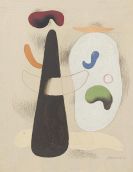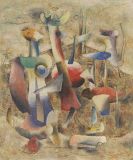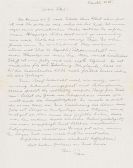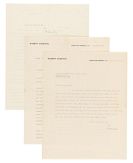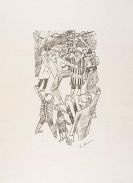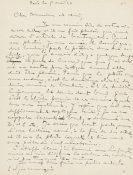
Wilhelm Wagenfeld
Bremen
1900 -
Stuttgart
1990
Wilhelm Wagenfeld served an apprenticeship as a silversmith from 1914 in the design office of the silverware factory Koch & Bergfeld in his native Bremen, to which he remained attached throughout his life. At the same time Wilhelm Wagenfeld attended the Bremen Kunstgewerbeschule between 1916 and 1919. For the years 1919 to 1922 Wilhelm Wagenfeld was a scholarship student at the Fachschule für Edelmetalle at Hanau Drawing Academy. In 1922-23 Wilhelm Wagenfeld stayed in Bremen and Worpswede, became friends with Heinrich Vogeler and Bernhard Hoetger, and became enthusiastic about Expressionism.
Wilhelm Wagenfeld was enrolled at the Bauhaus in Weimar from 1923 until 1935, where his teachers at the metalworking workshop were László Moholy-Nagy and Christian Dell. In 1926 Wagenfeld did not accompany the Bauhaus to Dessau but instead became an assistant at the metals workshop at the Staatliche Bauhochschule Weimar. Wilhelm Wagenfeld was director of the Bauhochschule from 1928 until it closed in 1930.
From 1931 until 1935 Wilhelm Wagenfeld worked for the Jena glassworks Schott & Gen., designing heat-resistant household glass, including a glass tea service (1931). Then Wagenfeld worked for the Vereinigte Lausitzer Glaswerke Weißwasser. Wilhelm Wagenfeld aimed his designs increasingly at mass production. In 1938 Wagenfeld designed the stackable glass service "Kubus" for VLG.
Wagendfeld also accepted freelance commissions from Hutschenreuther, Fürstenberg, and Rosenthal. From 1947 until 1949 Wilhelm Wagenfeld was a professor at the Hochschule für Bildende Künste in Berlin, subsequently teaching at numerous academies and institutes. In 1949 Wilhelm Wagenfeld moved to Stuttgart, where he became artistic director for metal and glass at the Württembergische Metallwarenfabrik (WMF). On the side, Wilhelm Wagenfeld also had consultancy contracts with Pott/Solingen, Rosenthal/Selb (porcelain and glass), and Peill & Putzler/Düren (lighting, later also goblets). In 1954 Wilhelm Wagenfeld founded a practice of his own in Stuttgart, the "Werkstatt Wagenfeld, Versuchs- und Entwicklungswerkstatt für Industriemodelle" (until 1978). In 1966 WMF terminated Wagenfeld's contract but by 1970 William Wagenfeld had signed a new contract with WMF. His work for WMF was Wilhelm Wagenfeld's most all-encompassing as well as productive undertaking. In Wilhelm Wagenfeld authorized and revised a new edition of his famous Bauhaus lamps (1924) made in 1980 by Tecnolumen in Bremen.
Wilhelm Wagenfeld is one of the most important and influential of all German industrial designers.
Would you like to sell a work by Wilhelm Wagenfeld?
Infos for seller
